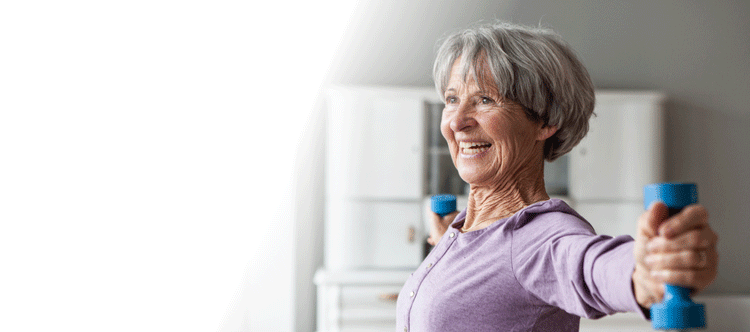

AGE OR CHRONIC HEALTH CONDITIONS CAN PUT YOU AT HIGHER RISK.
Interested in both?
increase-risk
You've done a lot to maintain a healthy lifestyle.
But if you're 70 or older, it's harder for your body to defend itself against pneumococcal pneumonia, putting you at increased risk of getting it. That's because the immune system weakens with age.
health-condition
Other risk factors and groups at risk include:1,2
- Smoking or being exposed to tobacco smoke.
- Respiratory conditions (such as asthma, chronic obstructive pulmonary disease).
- Chronic medical conditions (such as diabetes, heart disease, liver disease, kidney disease).
- Weak immune system (caused by conditions such as HIV/AIDS, receiving chemotherapy for cancer, use of steroids for a long time, having no spleen, or organ transplants).
- Having recently had the cold or flu.
- Aboriginal and Torres Strait Islander people.
Aboriginal and Torres Strait Islander people
Aboriginal and Torres Strait Islander adults have a high prevalence of invasive pneumococcal disease (IPD) risk factors. The higher burden of disease in Aboriginal and Torres Strait Islander adults also includes a higher proportion of disease estimated around 26% of IPD cases.3 This higher prevenance is when compared to non-Indigenous adults.
Babies 12 months and under
Together with elderly people, infants bear the highest burden of disease of IPD.
In children, the most common manifestation is bacteraemia without focus. This accounts for approximately 70% of IPD, followed by pneumonia with bacteraemia.
Meningitis is the least common but most severe category of IPD. Pneumococcal meningitis symptoms include:
- stiff neck
- fever
- headache
- sensitivity to light
- confusion
- irritability
- seizures
Acute middle ear infection is the most common non-invasive manifestation of pneumococcal disease in children. Streptococcus pneumoniae is detected in 28–55% of test samples from children with acute middle ear infection.7
People 70 years of age and older
There are several reasons why people 70 years and older are more likely to develop pneumonia:6
- Weaker immune system. As we age, our immune defence system doesn't work at 100%, leaving you more vulnerable to infection.
- Ineffective ability to cough out germs. One of the ways our body gets rid of harmful germs in our airways is by trapping them in mucus and coughing it out. Inability to do this well can increase the chance of harmful germs reaching the lungs.
- Higher likelihood of having other health conditions that make you more vulnerable. Certain conditions like chronic obstructive pulmonary disease, heart failure, diabetes, conditions that weaken your immune system and some forms of cancer have been shown to increase a person's risk.
risk-assessment-section
Take the risk assessment.
Just answer a few questions to get personalised risk results you can share with your doctor.
What is your age?
Age can be a risk factor, even if you're healthy.
- I am under 50
- I am 50-64
- I am 65-70
- I am 70 or older
Next: Your health conditions
Do you have any chronic health conditions?
Certain conditions may put you at higher risk for pneumococcal pneumonia, even if they're under control. The medicines you take may also affect your risk. Select all that apply.
- Asthma
- Chronic lung disease
- Heart disease
- Diabetes
- Chronic renal failure
- Certain Cancers
- Non-functioning spleen (asplenia)
- HIV
- I do not have any of these conditions
Do you take a medicine that suppresses your immune system? This includes some medicines that treat psoriatic arthritis, rheumatoid arthritis. Crohn's disease, or ulcerative colitis, among other conditions.
- Yes I am taking a medicine that suppresses my immune system.
- No I am not taking a medicine that suppresses my immune system.
Back Next: Your risk assessment results
Your risk assessment results for pneumococcal pneumonia
Talk to your Doctor, Nurse or Pharmacist about how you could protect yourself against pneumococcal pneumonia. Bring a copy of this assesment with you to help get the conversation started.
References:
- Pneumonia. Health Direct. Pneumonia - causes, symptoms and treatments | healthdirect Accessed Sep 8, 2023.
- Pneumonia. Lung Foundation Australia. Pneumonia - Lung Foundation Australia Accessed Sep 8, 2023.
- Australian Government Department of Health and Aged Care, Australian Immunisation Handbook: Pneumococcal Disease, Accessed May 2024.
- Stupka JE, Mortenson EM, Anzueto A, et al. Community-acquired pneumonia in elderly patients. Aging health. 2009 ; 5(6): 763–774.
- Australian Immunisation Handbook – Pneumococcal Disease. Australian Government Department of Health and Aged Care. Accessed April 2024.

